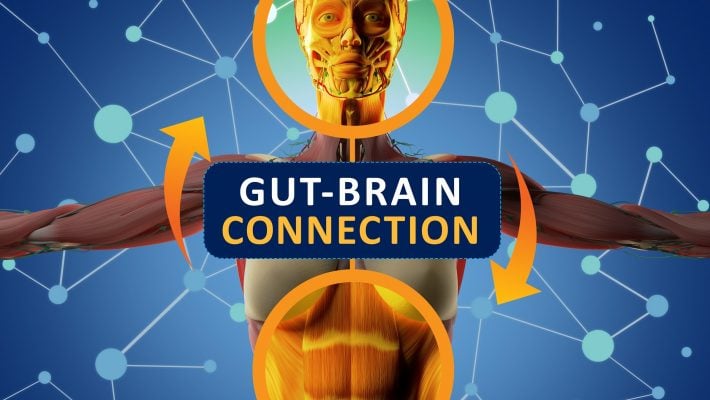
Your Gut and Brain Connection May Govern How You Feel
Understanding the Gut-Brain Axis
The gut-brain axis refers to a bidirectional connection between the gut and the central and enteric nervous systems. “Bidirectional” means that one can affect the other, and vice versa. It has been long known that mood issues are often associated with gastrointestinal issues, while clinical practice often shows a link between dysbiosis and central nervous concerns. Dysbiosis refers to an imbalance in the “good” and “bad” bacteria living within your gut, often resulting in common gastrointestinal issues like occasional diarrhea, occasional constipation, gas, and bloating.
How the Gut-Brain Axis Works
This bidirectional connection between your gut microbiota and your brain is more complex than G.I. experts currently understand. The actual mode of communication may work by several mechanisms.
Studies suggest that communication between the gut and the brain is mediated by the vagus nerve, one of the major nerves connecting the gut and brain. Severing the vagus nerve inhibited the mood enhancing and gene expression effects associated with the bacteria Lactobacillus rhamnosus. Further evidence has suggested that stress may inhibit activity within the vagus nerve and contribute to gastrointestinal issues.
More recent research has discovered other means of potential communication, particularly the products derived from bacteria within the gut that may signal effects within the nervous system. For instance, offspring from immune-challenged mice exhibited signs of gut dysbiosis, as well as behavioral abnormalities (including occasional restlessness), disrupted intestinal integrity, and high serum levels of a microbial metabolite. Interestingly, when this metabolite was injected into healthy, wild-type mice, it induced restlessness-like behavior.
Neurotransmitters are chemicals produced in the brain that signal various behaviors and control emotions. Many of the neurotransmitters produced in the brain are also coincidentally produced by the gut cells and the gut bacteria. For example, serotonin is the neurotransmitter responsible for contributing to feelings of happiness and well-being, and a deficiency of serotonin is often characteristic of “feeling blue.” However, a large proportion of the body’s serotonin is housed within the gastrointestinal tract.
How to Support the Gut-Brain Axis
While the exact biological mechanisms of how your gut and brain communicate still require further research, there’s an understanding that supporting your gut bacteria can contribute to a healthy gut-brain axis and better health overall.
Colostrum
Colostrum is produced by female mammals prior to the production of breast milk. It’s a nutrient-dense substance and necessary for newborn mammals to maintain a healthy immune system. Although humans receive most of their immunities from the placenta, mother’s colostrum is vital to optimal growth and development, as is breastfeeding for an extended period of time. Experience shows that non-breastfed babies, children, and adults of all ages benefit from colostrum supplementation.
Bovine (cow) colostrum has been shown to help with gut dysbiosis and minimize the symptoms of leaky gut, which is characterized by intestinal permeability. Overall, bovine colostrum may benefit brain health, as well as immune functions and metabolism. This results from the 90 bioactive substances in colostrum, which can be categorized into nutritional factors, immune factors, and growth factors.
Nutritional factors refer to fats, carbohydrates, and protein, along with the diverse range of vitamins and minerals. The immune factors refer to immunoglobulins designed to support the immune system. Growth factors stimulate cell growth and repair, thereby restoring intestinal permeability to acceptable levels. Growth factors can positively affect nearly every type of tissue in the human body, thus making bovine colostrum an ideal foundational nutritional supplement.
Probiotics
Probiotics generally refer to the good bacteria the populate the gut. Probiotic-rich foods and supplements may help to maintain your gut bacteria, keeping the population of good bacteria at a sufficient level to prevent dysbiosis.
Probiotic-rich foods usually comprise fermented foods, including:
- Yogurt
- Kefir
- Kimchi
- Kombucha
- Sauerkraut
In lieu of probiotic foods, you might consider taking a probiotic supplement.
Prebiotics
Whereas probiotics repopulate gut bacteria, prebiotics act to feed the existing bacteria in your gut, helping them to grow and multiply. Prebiotics generally consist of plant-based foods high in dietary fiber. Dietary fiber cannot be digested by the human stomach, which is important. This ensures that the fiber can withstand the harsh acids of the stomach and pass into the intestines, where the majority of the gut bacteria reside. High fiber foods, including kale, broccoli, and other cruciferous vegetables, may offer prebiotic benefits.
Maintaining a healthy gut may help to support your mental and emotional health. Along with professional help, consider taking a bovine colostrum supplement to help maintain the gut-brain axis.
Reources:
- https://www.health.harvard.edu/staying-healthy/can-gut-bacteria-improve-your-health
- https://www.ncbi.nlm.nih.gov/pmc/articles/PMC4367209/
- https://www.nature.com/articles/d42859-019-00021-3
- https://www.healthline.com/nutrition/gut-brain-connection
- https://www.ncbi.nlm.nih.gov/pubmed/11297721



